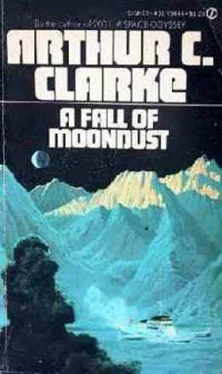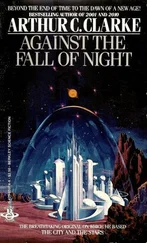Arthur Clarke - A Fall of Moondust
Здесь есть возможность читать онлайн «Arthur Clarke - A Fall of Moondust» весь текст электронной книги совершенно бесплатно (целиком полную версию без сокращений). В некоторых случаях можно слушать аудио, скачать через торрент в формате fb2 и присутствует краткое содержание. Жанр: Фантастика и фэнтези, на английском языке. Описание произведения, (предисловие) а так же отзывы посетителей доступны на портале библиотеки ЛибКат.
- Название:A Fall of Moondust
- Автор:
- Жанр:
- Год:неизвестен
- ISBN:нет данных
- Рейтинг книги:5 / 5. Голосов: 1
-
Избранное:Добавить в избранное
- Отзывы:
-
Ваша оценка:
- 100
- 1
- 2
- 3
- 4
- 5
A Fall of Moondust: краткое содержание, описание и аннотация
Предлагаем к чтению аннотацию, описание, краткое содержание или предисловие (зависит от того, что написал сам автор книги «A Fall of Moondust»). Если вы не нашли необходимую информацию о книге — напишите в комментариях, мы постараемся отыскать её.
A Fall of Moondust — читать онлайн бесплатно полную книгу (весь текст) целиком
Ниже представлен текст книги, разбитый по страницам. Система сохранения места последней прочитанной страницы, позволяет с удобством читать онлайн бесплатно книгу «A Fall of Moondust», без необходимости каждый раз заново искать на чём Вы остановились. Поставьте закладку, и сможете в любой момент перейти на страницу, на которой закончили чтение.
Интервал:
Закладка:
“My alias is Hanson. Since I retired, I've been trying to do a little sightseeing without quite so much responsibility. And now that I've shaved off my beard, no one ever recognizes me.”
“I'm very glad to have you here”, said Pat, with deep feeling. Already some of the weight seemed to have lifted from his shoulders; the Commodore would be a tower of strength in the difficult hours — or days — that lay ahead.
“If you don't mind”, continued Hansteen, with that same careful politeness, “I'd appreciate an evaluation. To put it bluntly, how long can we last?”
“Oxygen's the limiting factor, as usual. We've enough for about seven days, assuming that no leaks develop. So far, there are no signs of any.”
“Well, that gives us time to think. What about food and water?”
“We'll be hungry, but we won't starve. There's an emergency reserve of compressed food, and of course the air purifiers will produce all the water we need. So there's no problem there.”
“Power?”
“Plenty, now that we're not using our motors.”
“I notice that you haven't tried to call Base.”
“It's useless; the dust blankets us completely. I've put the beacon on emergency — that's our only hope of getting a signal through, and it's a slim one.”
“So they'll have to find us in some other way. How long do you think it will take them?”
“That's extremely difficult to say. The search will begin as soon as our twenty hundred hours transmission is missed, and they'll know our general area. But we may have gone down without leaving any trace — you've seen how this dust obliterates everything. And even when they do find us —”
“How will they get us out?”
“Exactly.”
Skipper of twenty-seat dust-cruiser and Commodore of space stared at each other in silence, as their minds circled the same problem. Then, cutting across the low murmur of conversation, they heard a very English voice call out: “I say, Miss — this is the first decent cup of tea I've drunk on the Moon. I thought no one could make it here. My congratulations.”
The Commodore chuckled quietly.
“He ought to thank you, not the stewardess”, he said, pointing to the pressure gauge.
Pat smiled rather wanly in return. That was true enough; now that he had put up the cabin pressure, water must be boiling at nearly its normal, sea-level temperature back on Earth. At last they could have some hot drinks — not the usual tepid ones. But it did seem a somewhat extravagant way to make tea, not unlike the reputed Chinese method of roasting pig by burning down the entire house.
“Our big problem”, said the Commodore (and Pat did not in the least resent that “our”), “is to maintain morale. I think it's important, therefore, for you to give a pep talk about the search procedure that must be starting now. But don't be too optimistic; you mustn't give the impression that someone will be knocking on the door inside half an hour. That might make it difficult if — well, if we have to wait several days.”
“It won't take me long to describe the MOONCRASH organization”, said Pat. “And, frankly, it wasn't planned to deal with a situation like this. When a ship's down on the Moon, it can be spotted very quickly from one of the satellites — either Lagrange II, above Earthside, or Lagrange I, over Farside. But I doubt if they can help us now. As I said, we've probably gone down without leaving a trace.”
“That's hard to believe. When a ship sinks on Earth, it always leaves something behind — bubbles, oil slicks, floating wreckage.”
“None of those apply to us. And I can't think of any way we could send something up to the surface — however far away that is.”
“So we just have to sit and wait.”
“Yes”, agreed Pat. He glanced at the oxygen-reserve indicator. “And there's one thing we can be sure of: we can only wait a week.”
Fifty thousand kilometers above the Moon, Tom Lawson laid down the last of his photographs. He had gone over every square millimeter of the prints with a magnifying glass. Their quality was excellent; the electronic image intensifier, millions of times more sensitive than the human eye, had revealed details as clearly as if it were already daylight down there on the faintly glimmering plain. He had even spotted one of the tiny dust-skis — or, more accurately, the long shadow it cast in the earthlight. Yet there was no trace of Selene; the Sea was as smooth and unruffled as it had been before the coming of Man. And as it would be, in all probability, ages after he had gone.
Tom hated to admit defeat, even in matters far less important than this. He believed that all problems could be solved if they were tackled in the right way, with the right equipment. This was a challenge to his scientific ingenuity; the fact that there were many lives involved was immaterial. Dr. Tom Lawson had no great use for human beings, but he did respect the Universe. This was a private fight between him and It.
He considered the situation with a coldly critical intelligence. Now how would the great Holmes have tackled the problem? (It was characteristic of Tom that one of the few men he really admired had never existed.) He had eliminated the open Sea, so that left only one possibility. The dust-cruiser must have come to grief along the coast or near the mountains, probably in the region known as — he checked the charts — Crater Lake. That made good sense; an accident was much more likely here than out on the smooth, unobstructed plain.
He looked at the photographs again, this time concentrating on the mountains. At once, he ran into a new difficulty. There were scores of isolated crags and boulders along the edge of the Sea, any one of which might be the missing cruiser. Worse still, there were many areas that he could not survey at all, because his view was blocked by the mountains themselves. From his vantage point, the Sea of Thirst was far around the curve of the Moon, and his view of it was badly foreshortened. Crater Lake itself, for instance, was completely invisible to him, hidden by its mountain walls. That area could only be investigated by the dust-skis, working at ground level; even Tom Lawson's godlike eminence was useless here.
He had better call Earthside and give them his interim report.
“Lawson, Lagrange II”, he said, when Communications had put him through. “I've searched the Sea of Thirst — there's nothing in the open plain. Your boat must have gone aground near the edge.”
“Thank you”, said an unhappy voice. “You're quite sure of that?”
“Absolutely. I can see your dust-skis, and they're only a quarter the size of Selene.”
“Anything visible along the edge of the Sea?”
“There's too much small-scale detail to make a search possible. I can see fifty — oh, a hundred — objects that might be the right size. As soon as the sun rises I'll be able to examine them more closely. But it's night down there now, remember.”
“We appreciate your help. Let us know if you find anything else.”
Down in Clavius City, the Tourist Commissioner heard Lawson's report with resignation. That settled it; the next of kin had better be notified. It was unwise, if not impossible, to maintain secrecy any longer.
He turned to the Ground Traffic officer and asked: “Is that passenger list in yet?”
“Just coming over the telefax from Port Roris. Here you are.” As he handed over the flimsy sheet, he said inquisitively: “Anyone important aboard?”
“All tourists are important”, said the Commissioner coldly, without looking up. Then, in almost the same breath, he added: “Oh, my God!”
“What's the matter?”
“Commodore Hansteen's aboard.”
“What? I didn't know he was on the Moon.”
Читать дальшеИнтервал:
Закладка:
Похожие книги на «A Fall of Moondust»
Представляем Вашему вниманию похожие книги на «A Fall of Moondust» списком для выбора. Мы отобрали схожую по названию и смыслу литературу в надежде предоставить читателям больше вариантов отыскать новые, интересные, ещё непрочитанные произведения.
Обсуждение, отзывы о книге «A Fall of Moondust» и просто собственные мнения читателей. Оставьте ваши комментарии, напишите, что Вы думаете о произведении, его смысле или главных героях. Укажите что конкретно понравилось, а что нет, и почему Вы так считаете.












